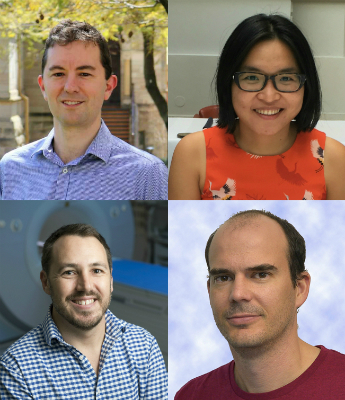Four researchers named Tall Poppy winners
Monday, 29 July 2019
 Four University of Adelaide researchers have won 2019 South Australian Tall Poppy Science Awards.
Four University of Adelaide researchers have won 2019 South Australian Tall Poppy Science Awards.
The Tall Poppy Awards, an initiative of the Australian Institute of Policy and Science, recognises achievement in the sciences and helps to communicate the passion and purpose of Australia’s finest scientists.
The University’s winners have made their mark in research including the conceptualisation, measurement, prevention and treatment of internet gaming disorder; using probability and statistics to gain insight and aid in decision-making processes; combining non-invasive brain stimulation and neuroimaging methods to investigate neurological differences in cognitive function; and the development of antimalarial drugs, including a vaccine for malaria.
The University of Adelaide’s 2019 Young Tall Poppy Science Award winners are:
Dr Daniel King - Research Field: Psychology, Behavioural Addictions
While digital technologies can have many benefits, they can also be overused and generate problems for many individuals and their families. Video gaming becomes problematic when players develop an online identity that demands a daily playing schedule, always meeting social obligations to play, and striving for constant rewards and challenges.
Dr King’s research focuses on ‘Internet gaming disorder’ and its conceptualisation, measurement, prevention, and treatment. His work has identified practical ways to combat excessive gaming, such as challenging unhelpful thoughts, understanding the ways that games are designed to be addictive, and promoting ‘technology-free’ days and engagement in other activities.
Daniel actively promotes his research findings in an array of areas, including at public lectures and at events focused on gambling addiction, contributes to online resources for parents through the Raising Children website, and engaged with young people about the benefits and drawbacks of technology. Dr King received his PhD from the University of Adelaide in 2010, and is currently a senior research fellow at the University of Adelaide.
Dr Giang Nguyen - Research Field: Mathematics, Applied Probability
Randomness affects the world around us every day. In order to make decisions, it is important to predict and understand the range of possible outcomes, and their likelihoods.
Dr Nguyen’s research uses probability and statistics to develop models to gain insight, and aid in decision-making processes in real-life situations. She has applied these models to a wide array of fields, ranging from cancer treatment, to predicting the South Australian power grid.
Giang’s enthusiasm for mathematics is shown by her numerous maths outreach activities, including, volunteering in the CSIRO Mathematics in Schools program, development of a Maths in Life app, and contributing to The Random Sample podcast. Dr Nguyen received her PhD from the University of South Australia in 2009, and is currently a senior lecturer at the University of Adelaide.
Dr Nigel Rogasch - Research Field: Neuroscience
Schizophrenia is associated with numerous cognitive defects closely linked to many poor functional outcomes. Many of these debilitating symptoms, including impaired memory and inability to concentrate, currently have no effective treatments.
Dr Rogasch’s research combines non-invasive brain stimulation and neuroimaging methods to uncover differences in prefrontal mechanisms between people with healthy cognitive function and those with schizophrenia, and looks at identifying how best to alter these mechanisms. This research has the potential to inform potential new treatments for improving cognitive function across a vast range of brain disorders.
Nigel’s enthusiastic science communication spans national television programs, radio and print interviews, and regular public lectures and school visits. He also established a work experience program that brings school students into the lab, and developed a science club with primary school students. Dr Rogasch received his PhD from Monash University in 2014, and is currently a senior research fellow at the University of Adelaide, South Australian Health and Medical Research Institute, and Monash University.
Dr Danny Wilson - Research Field: Malaria Biology, Parasitology
Every year more than 400,000 children globally die of disease caused by malaria parasites. The mosquitoes that transmit the parasite are becoming resistant to our best insecticides, and in some places, the parasite is becoming resistant to many of the drug therapies that were previously effective.
Dr Wilson’s research is focused on tackling this issue on two fronts: developing new drugs that kill malaria parasites, and working on developing a vaccine for the parasites. He has identified new drug chemotypes to develop as antimalarials, and developed new parasite tools to fast-track malaria vaccine development.
Danny communicates his science through numerous radio interviews, using a claymation video, and through science evenings at kindergartens. Dr Wilson received his PhD from the University of Melbourne in 2009, and is currently a senior postdoctoral fellow at the University of Adelaide.
Pictured: (Top left clockwise) Dr King, Dr Nguyen, Dr Wilson and Dr Rogasch.
Contact details
Email: crispin.savage@adelaide.edu.au
Website: https://www.adelaide.edu.au/
Media and Communications Officer
University of Adelaide
Business: +61 (0)481 912 465







